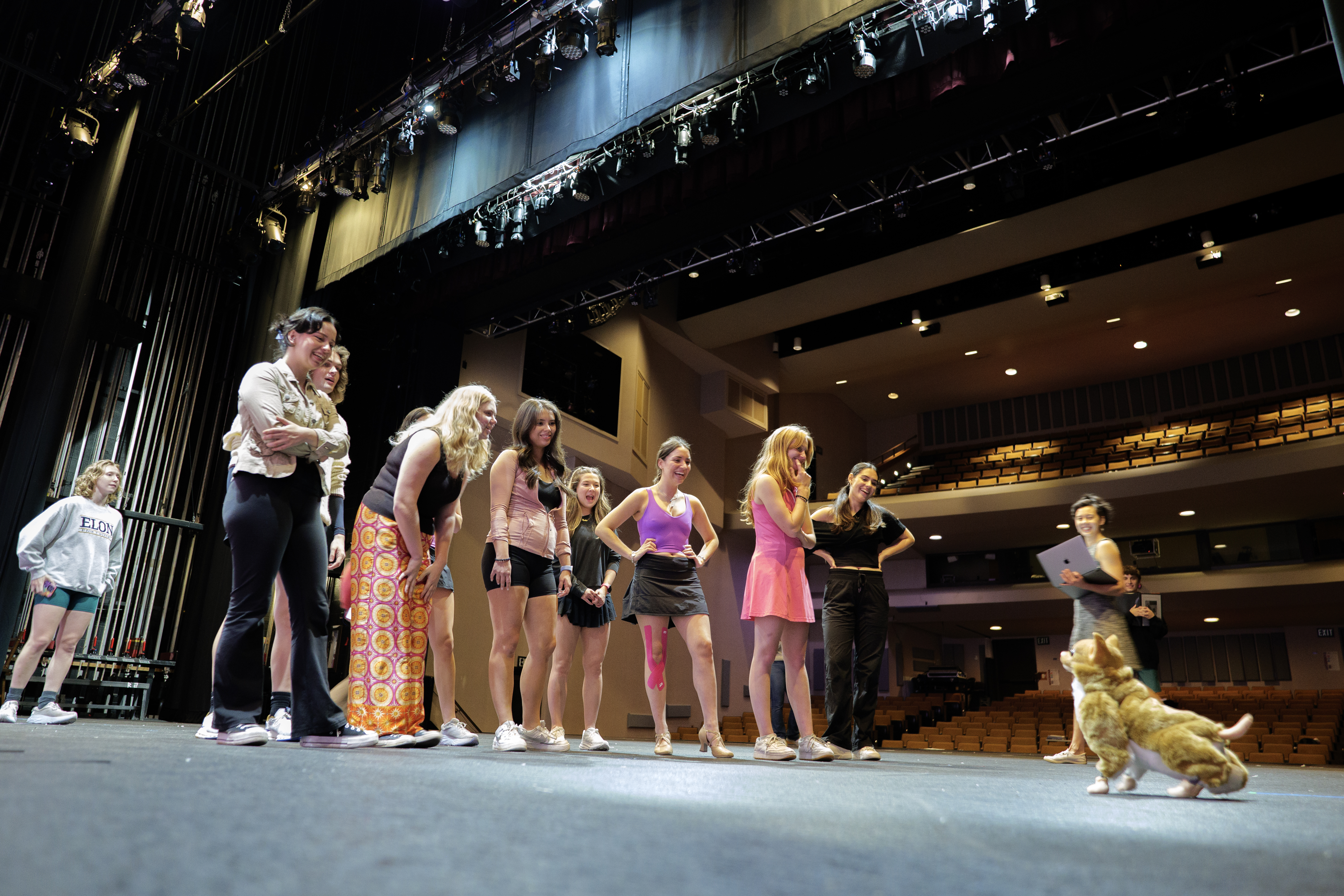A cutting-edge collaboration between the Music Theatre Program and the Department of Engineering creates a first for Elon’s stage and provides opportunities for students to grow knowledge and skills beyond their disciplines.
Innovation will take center stage when the musical “Legally Blonde” opens at Elon this weekend. For the first time, robots will share the stage with live actors.
Fans of the 2001 movie-turned-musical are no doubt familiar with its loveable canine sidekicks: the iconic Bruiser, main character Elle Woods’ chihuahua, and Rufus, manicurist and confidant Paulette Bonafonté’s bulldog.
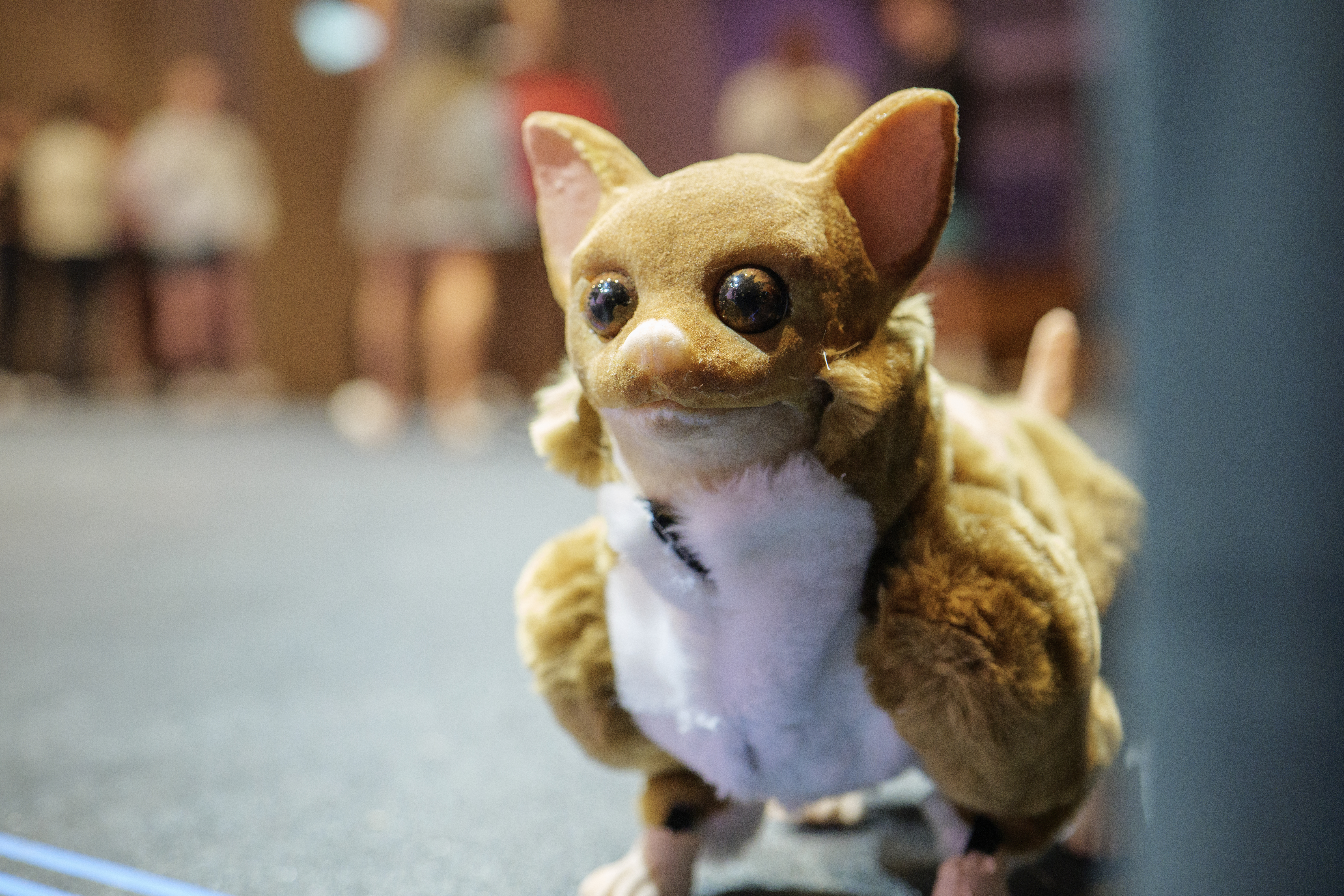
In a collaboration between Elon’s Music Theatre Program and the Department of Engineering, the show’s co-starring dogs will be played by quadruped robots programmed, costumed and controlled by engineering students. The musical follows heroine Elle Woods as she journeys from UCLA to Harvard Law School, tackling stereotypes and navigating sexual assault and harassment, on her way to becoming a lawyer.
“I think Bruiser and Rufus are definitely going to steal the show,” Emily Stober ’25 said, laughing. A music theatre major from Hickory, North Carolina, Stober plays Elle Woods in Elon’s production. “This is the perfect balance of having a live animal onstage versus an inanimate object. It still has that ‘breath’ to it, and it’s a tool I think could be used more in theatre and music in the future.”
“Legally Blonde” opens Friday, Oct. 25, at 7:30 p.m. in McCrary Theatre in Elon’s Center for the Arts. The musical runs for five additional showings on Oct. 26, Oct. 31 and Nov. 1-2 at 7:30 p.m. and on Sunday, Oct. 27, at 2 p.m. Tickets are available at Elontickets.com.
The creative partnership showcases the kind of interdisciplinary collaboration that’s a hallmark of Elon’s approach to education, where ideas and input from a wide range of academic perspectives are sought out and celebrated. It’s also illuminated new career paths for some of the students involved.
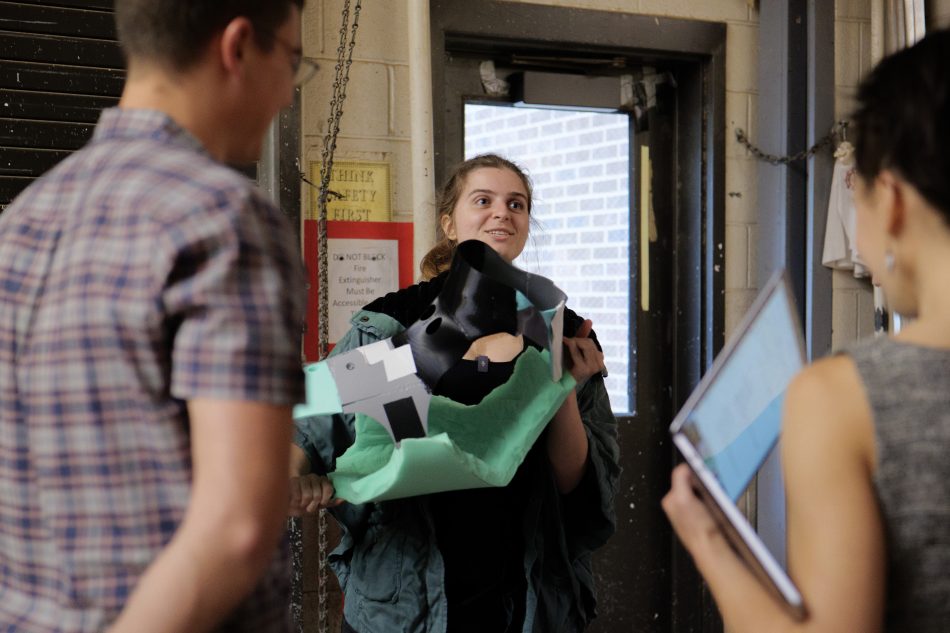
It began when Assistant Professor of Music Theatre Courtney Liu, who is directing “Legally Blonde,” and Assistant Professor of Engineering Blake Hament were brainstorming ways to blend their fields at Elon. Liu researches the psychology of performance, and beyond that desires to provide Elon’s budding professionals with broad experiences that will enrich their careers. Hament’s research includes developing quadrupeds and other robots for use as service animals.
The project advances solutions in both disciplines. Trained animals are expensive and can be unpredictable during live performances. The public often finds quadruped robots’ appearance unsettling but finding ways to make them appear more lifelike could advance their use as service animals. Liu and Hament received a grant from the Elon University Fund For Excellence in the Arts and Sciences to pursue the collaboration.
‘So many doors have opened’
Zoe Scherpbier ’25 jumped at the chance to design and fabricate the dogs’ costumes. An engineering major from San Diego, California, she’d completed undergraduate research with Hament in 2023-24 to develop touch-sensitive “fur” for quadruped robots. She also has a theatre background and has sewn since her grandmother taught her at a young age.
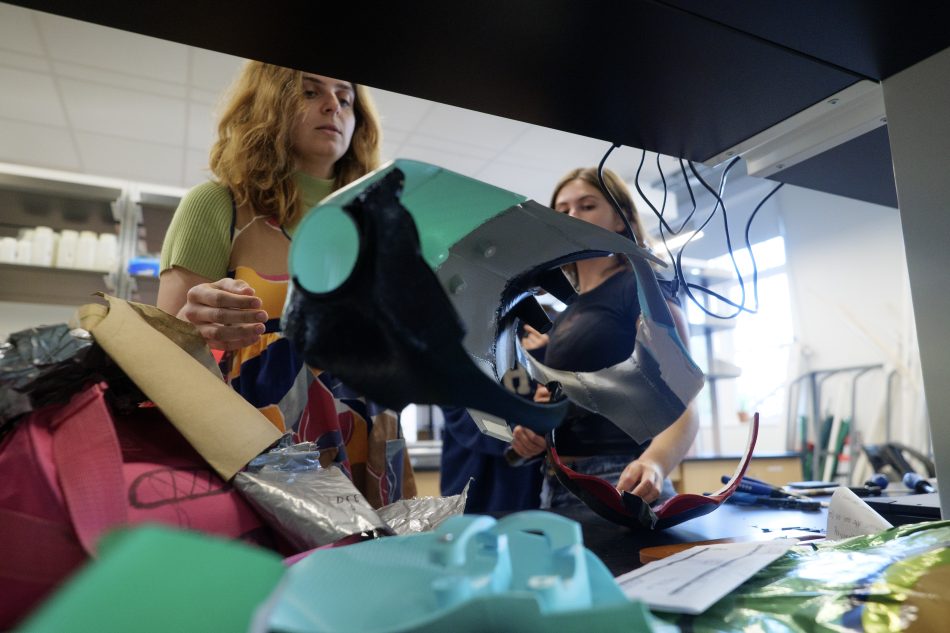
“I love theatre. The costumes and the bedazzlement have always drawn my eye,” Scherpbier said. “The actors and actresses in “Legally Blonde” have had such a great reaction to the dogs. They really loved them, and it’s been fun being a part of the community of actors and crew as they work so hard to put on this show.”
Since the summer, she’s spent one day a week at the University of North Carolina School of the Arts (UNCSA) in Winston-Salem, which hosts one of the nation’s top animatronics programs. With graduate student Carlitos Ayma Gonzalez, she’s designed silicone molds and flocked them with “fur” to look like real dogs. In the process, Scherpbier discovered a new career path and plans to pursue graduate studies in animatronics at UNCSA.
“This has broadened the horizons of what I can do with an engineering degree, seeing that there’s a place I can use what I’ve learned in engineering and in the arts” Scherpbier said. “Being an Imagineer at Disney would be so cool. So many doors have opened through working with Dr. Hament.”
Scherpbier worked with Liu and Hament to design the costumes for function and aesthetics. Rufus’ dog costume posed the greatest challenge. The dog has been transformed into a pitbull mix for Elon’s production to allow the robot to move beneath the costume and for quick battery changes between scenes.
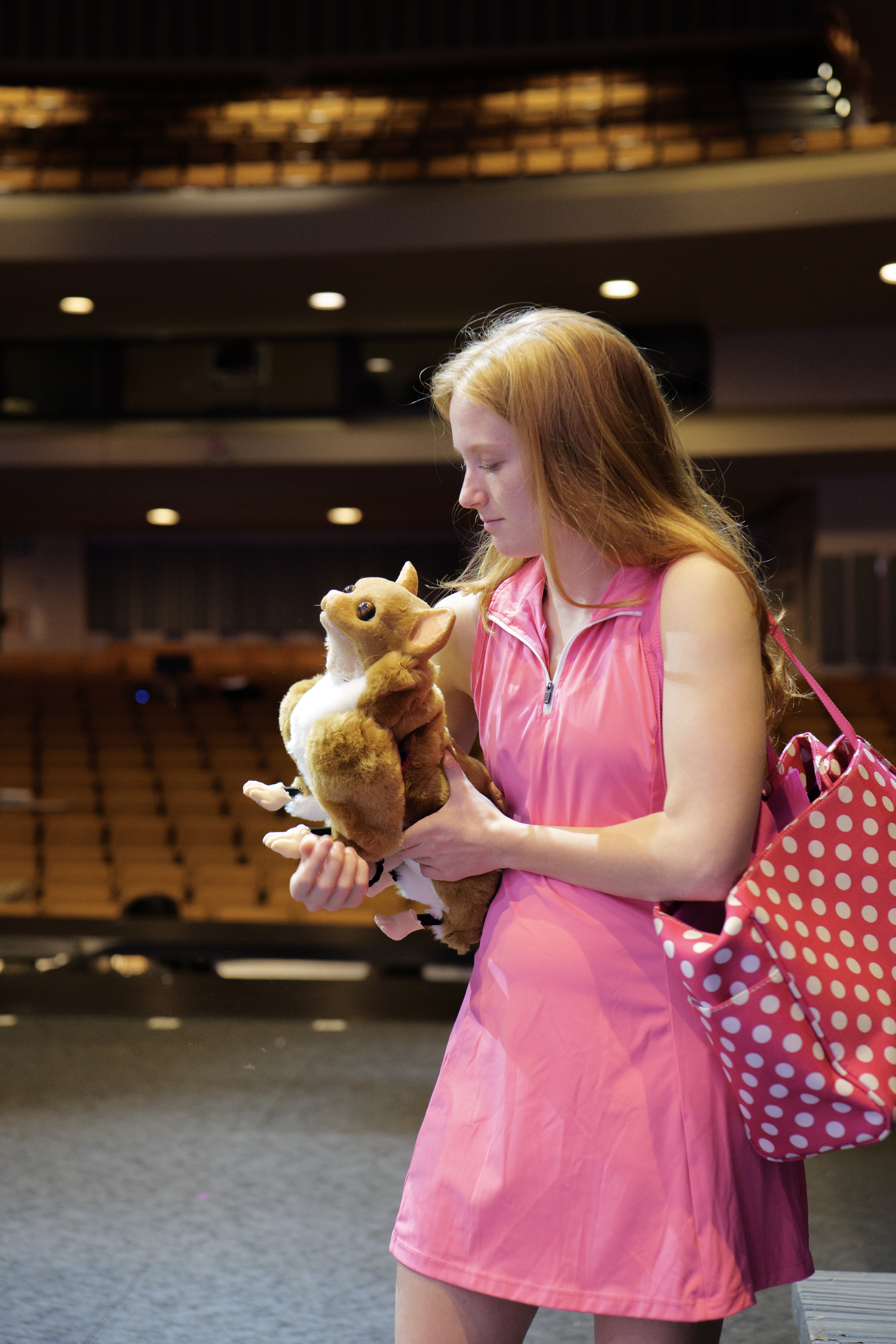
The more than 30 other students in the Department of Performing Arts staging “Legally Blonde” were enthusiastic when they learned that engineering students would be part of the production. They’ve put in more than 25 hours a week rehearsing and preparing the show and were ready to welcome new team members into their community.
“I was really excited to work with the engineering department,” Stober said. “So much of acting is just play, and things like this keep it exciting for us actors. It’s been fun to have students who don’t know theatre as much join us in this process. It’s been interesting to see them learn our lingo and us learn their lingo, and I’ve appreciated being part of a collaboration I might not have had elsewhere.”
Liu attributes that to the kinds of students Elon recruits to its music theatre and performing arts programs: ambitious, highly talented and interested in having broad educational experiences in the liberal arts unavailable at conservatories. Elon’s Music Theatre Program is regularly recognized as among the best schools in the nation for music theatre.
“These students understand the connection between responsibility, hard work and true collaboration,” Liu said. “I am absolutely in awe of their dedication, grit, thirst for excellence, athletic prowess, artistic depth and commitment to each other and their craft.”
Expanding opportunities for students
Behind the scenes, other engineers have entered the spotlight. Jack Delucco ’26 programmed the robot controls. Maggie Dion ’26 and Amalie Keefe ’26 will control the dogs movements, reacting to dialogue and queues, during the staged performances.
Dion, from Attleboro, Massachusetts, is controlling Bruiser. Keefe, from Durham, North Carolina, is handling Rufus, whose onstage role is slightly more complex. In the wings with the technical crew, they manipulate the robots to perform dances, nods, spins and wags alongside actors onstage. Dion previously researched quadruped robots with Hament, exploring adding “dog ears” of different shapes to make them look friendlier. Keefe researched the creation of a voice module that would turn human commands into code that would trigger the robots’ actions. Both have benefitted from seeing the time and effort that goes into staging a musical, and each are interested in future robotics research and collaborations.
“This has taught me that engineering and robotics can exist in unexpected places,” Dion said. “I wouldn’t have thought I’d be involved in a play this year, but now I see that engineering can be in other parts of life.”
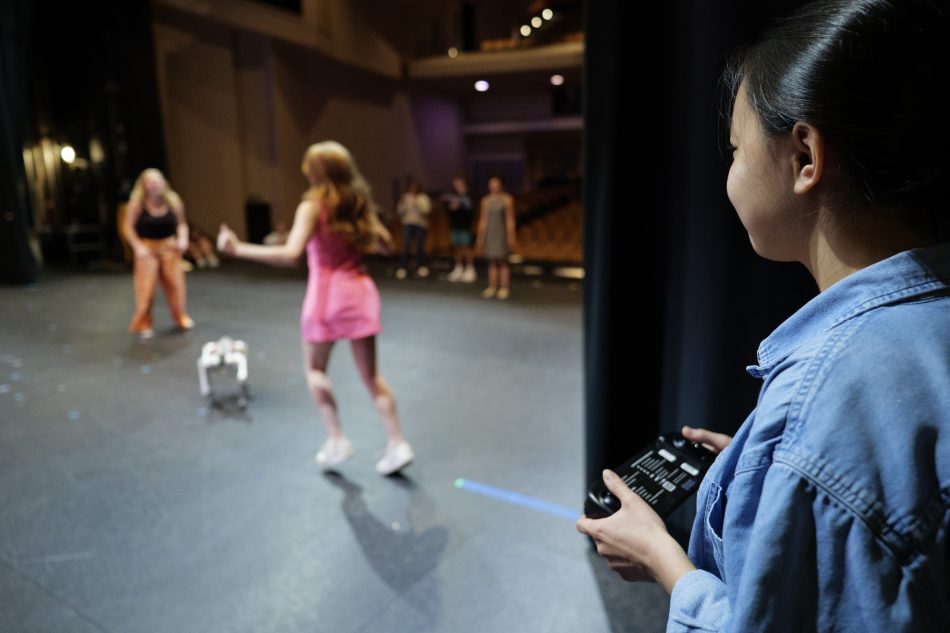
Though engineering and music theatre may not at first seem complementary, Liu and Hament have discovered that they employ similar problem-solving methods and constraints in each of their disciplines. Infusing new perspectives also brings better solutions, they said.
“We’ve seen concern globally that some engineers are developing technology that has downsides or risks they hadn’t considered,” Hament said. “If we bring more voices into the conversation and work with people outside our field, that will help steer AI and technology in better directions.”
The professors remain excited by the prospect of advancing future collaborations and exposing students to disciplines outside of their majors.
“These kinds of collaborations expand opportunities for our programs and students,” Liu said. “In theatre, they allow us to explore additional material and works we might not have. We’re always looking for creative solutions so we can create bigger art.”
When “Legally Blonde” ends its run, Liu and Hament expect to publish an article about the experience with Elon undergraduates as co-authors.



